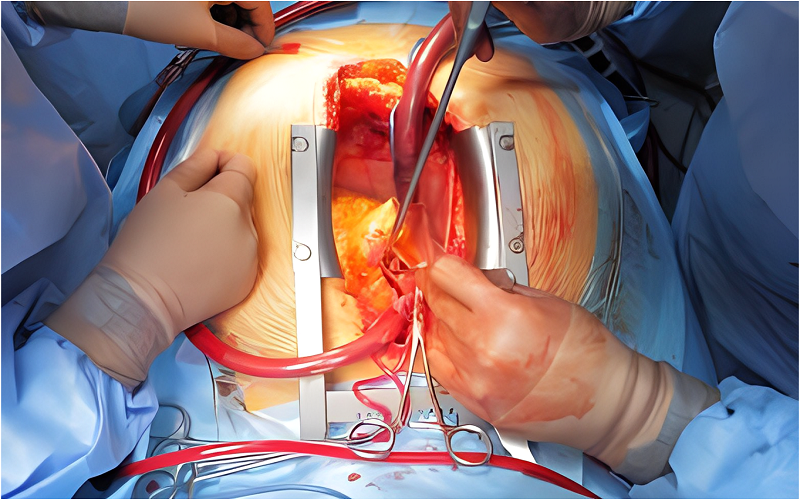Open heart surgery, also known as a heart operation, is a medical procedure that can be a life-saving intervention for various cardiovascular conditions. As individuals embark on the journey of recovery after open heart surgery, it’s crucial to have a comprehensive understanding of what lies ahead. Today, we will explore five key aspects that patients can expect during the recovery process of such a heart operation. From the immediate postoperative period to long-term considerations, we aim to provide valuable insights for those seeking information on heart surgery recovery.
It must be pointed out that such surgeries are complex medical procedures, something that calls for a great deal of expertise and care. Visiting a top hospital in Gurgaon to get one done would be the best fit in such cases.
Immediate Postoperative Period:
The first thing to anticipate after open heart surgery is the immediate postoperative period. Typically, patients are closely monitored in the intensive care unit (ICU) to ensure a smooth transition from surgery to recovery. The initial hours and days following the heart operation are critical for the medical team to manage pain, monitor vital signs, and address any potential complications.
During this phase, individuals may experience some discomfort or pain at the incision site. It’s essential to follow the prescribed pain management plan provided by the medical team to alleviate discomfort effectively. Additionally, patients may have tubes and monitors connected to them to assist with fluid drainage and monitor various aspects of their health, such as heart rate and oxygen levels.
The first 24 to 48 hours post-surgery are crucial for preventing complications, including infection and heart block. Heart block, a condition where the electrical signals in the heart are disrupted, can occur after open heart surgery but is often temporary and managed by the medical team. Regular monitoring and prompt intervention at a hospital in Gurgaon is vital during this period.
Gradual Physical Recovery:
As the immediate postoperative period transitions into the early stages of recovery, patients can expect a gradual increase in physical activity. Physical rehabilitation plays a crucial role in restoring strength and function to the cardiovascular system. The medical team, including physical therapists, will develop a personalized rehabilitation plan tailored to the individual’s condition and recovery progress.
Engaging in light exercises, such as walking and breathing exercises, is often encouraged to enhance lung function and prevent complications like pneumonia. It’s important for patients to adhere to the prescribed exercise regimen while gradually increasing intensity under the guidance of healthcare professionals.
It’s worth noting that the pace of physical recovery may vary among individuals, depending on factors such as overall health, age, and the specific type of open heart surgery performed. Patience and adherence to the rehabilitation plan are key elements in achieving optimal physical recovery.
Emotional and Mental Well-being:
Recovery from open heart surgery not only involves physical healing but also addresses the emotional and mental well-being of patients. It is common for individuals to experience a range of emotions, including anxiety, fear, or even depression, during the recovery process.
Understanding and acknowledging these emotions are crucial steps towards a holistic recovery. Support from family members, friends, and mental health professionals can be invaluable during this time. Many healthcare facilities offer counselling services as part of their postoperative care to address the psychological aspects of recovery.
Patients should also be aware of potential cognitive effects, commonly referred to as “pump head” syndrome, which may include difficulties with concentration and memory. These effects are typically temporary, but it’s essential to communicate any concerns with the medical team for appropriate guidance.
Medication Management and Follow-up Care:
After open heart surgery, individuals can expect a regimen of medications aimed at managing pain, preventing infection, and addressing specific cardiovascular issues. Compliance with prescribed medications is vital for a successful recovery and the prevention of complications.
Common medications post-open heart surgery may include blood thinners to prevent clot formation, antibiotics to prevent infection, and medications to manage blood pressure and cholesterol levels. It’s important to follow the medication schedule provided by healthcare professionals and report any adverse effects promptly.
In addition to medication management, regular follow-up appointments with the cardiac surgeon and other healthcare providers are crucial. These appointments allow for the monitoring of progress, adjustment of medications if necessary, and the identification of any potential issues early on.
Long-term Lifestyle Changes:
Recovery from open heart surgery often necessitates long-term lifestyle changes to promote heart health and prevent the recurrence of cardiovascular issues. Adopting a heart-healthy diet, engaging in regular physical activity, and managing stress are essential components of a post-surgery lifestyle.
Patients are often advised to follow a diet low in saturated fats, cholesterol, and sodium while incorporating a variety of fruits, vegetables, and whole grains. Regular exercise, as recommended by healthcare professionals, helps maintain cardiovascular fitness and overall well-being.
Smoking cessation is a critical aspect of long-term recovery, as smoking is a significant risk factor for cardiovascular diseases. Individuals who quit smoking after open heart surgery significantly improve their chances of long-term success and reduce the risk of complications.
Conclusion:
Recovery from open heart surgery is a multifaceted process that involves physical, emotional, and lifestyle considerations. By understanding the immediate postoperative period, engaging in gradual physical recovery, addressing emotional and mental well-being, managing medications and follow-up care, and adopting long-term lifestyle changes, individuals can navigate the road to recovery with greater confidence.
It’s important to note that each patient’s journey is unique, and the information provided here serves as a general guide. For personalised guidance and support, individuals should consult with their healthcare team, who can provide tailored advice based on their specific medical condition and progress. As individuals embark on this transformative journey, staying informed and actively participating in their recovery process can contribute to a successful and fulfilling life post-open heart surgery.
Want to experience the very best when it comes to open heart surgeries? Visit a super-speciality hospital in Gurgaon today.



